Neurodiversity is my superpower: My experience with Brain in Hand as a student
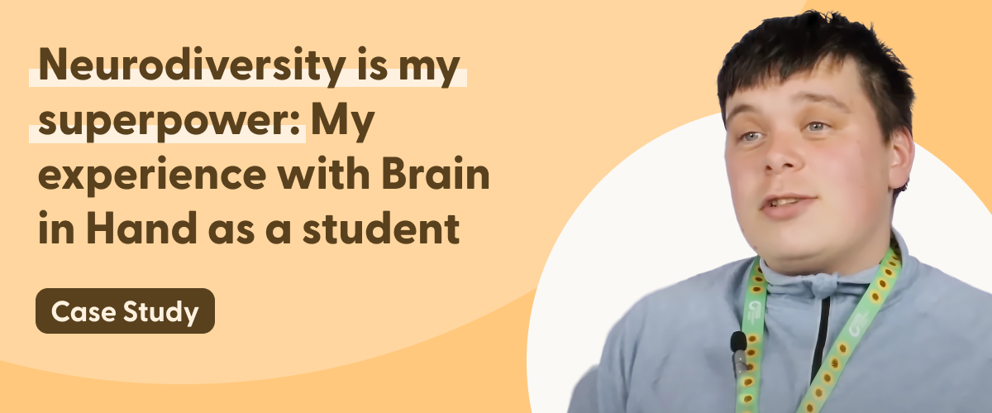
“Brain in Hand is the only app I use now for being autistic. Nothing compares to it. Everything is in one little bubble.”
Alfie, a 30-year old ODP student, is autistic and has recently been diagnosed with hyperactive ADHD, anxiety, and depression. Since using Brain in Hand, Alfie is able to enjoy university life, better communicate his needs, and regulate his feelings.
“Brain in Hand is my little psychic device that knows I need to regularly check-in. The traffic light system helps me regulate how I feel. If you're having a bad day, you know that there's always something on there that can help you or can get you through a tricky situation.”
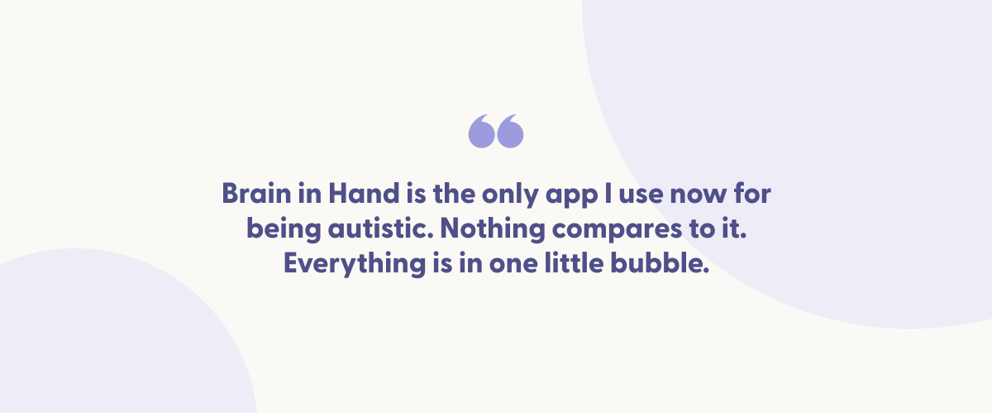
How Brain in Hand supports neurodivergent students
Our personalised support system provides students, like Alfie, with a range of practical digital tools for time management and mood tracking, on-demand 24/7 support, and 1-to-1 coaching. Alfie uses Brain in Hand to support himself and regularly check-in but also as a tool to educate those around him. He teaches them the benefits of Brain in Hand, allowing them to understand his support needs.
Communicating without words
For Alfie, Brain in Hand makes it possible to communicate his needs, even when he is overwhelmed and can’t express himself. He can keep his go-to coping strategies and reminders in the app, allowing him to share what he needs with others.
“Before Brain in Hand, I didn't know how to communicate how I was feeling. It was very difficult for people to understand how I was feeling because I couldn't express myself. There was only one way and it was a very negative way.”
Brain in Hand offers simple mood tracking using a traffic light system. Alfie uses this feature to share with others how he’s feeling and get the support he needs without using words. He’s taught others how Brain in Hand works, allowing them to sign-post Alfie back to his support system when he needs it.
“I've been using the traffic light system a lot and helping my peers at university as well. I’ve been teaching them about how it benefits me. They know what to do if I'm having a bad day or if I need to express how I feel. They get the app out and they just tell me, point to which one. I know I can communicate with them how I feel without even having to use any words.”
Alfie shares an experience that highlights how valuable Brain in Hand has been. He felt empowered to seek support and leave an overwhelming situation using Brain in Hand as means of non-verbal communication.
“We had a national ODP day at university. Everyone came together, all three years, everyone from different practices, all came into this one room. I just went into a shutdown. I couldn't communicate how I was feeling. I couldn't get any words out. And all of a sudden it was a case of; let's go back to the app, let's use the app the best I can.”
“Having the app on my phone meant that I was able to communicate with my friends. I needed to get out of this situation without having to even tell them because that was a massive deal for me. There were probably about 30-40 people in the room but I couldn’t express how I was feeling. They got my phone out and told me to use the app. Without the app, I wouldn't have even gone to that event.”
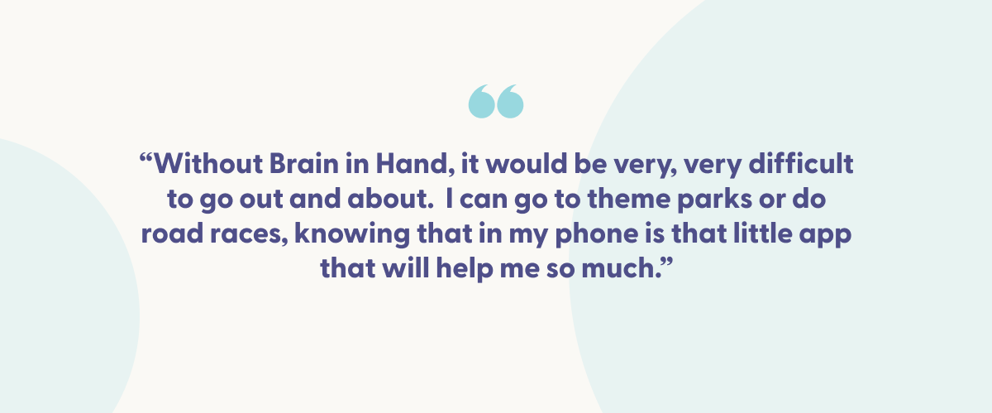
Going out and navigating university life
“University life would be a major challenge. I probably wouldn't even be able to go to university and communicate with people who I don't know. That would be a massive issue. I wouldn't be able to go out in public or go out and see my friends. Without Brain in Hand, it would be very, very difficult to go out and about.”
Alfie expresses how Brain in Hand has made it possible for him to attend university and self-regulate while on placement. Using Brain in Hand gives him the confidence to go out more often and engage in university life, knowing support is right there when he needs it.
“While I've been at university, I've come across several different situations where I've just gone ‘I can't deal with this’. I'm out on placement at the moment and can use my Brain in Hand while I'm there. I'm in a setting where I need to be professional, but I still need to self regulate. I'm helping the staff there as well understand about Brain in Hand, autism, and how they can benefit from the training and looking at the app.”
He’s also able to enjoy life outside of university, going to theme parks, road races, and going into the town. Alfie feels confident knowing that support is accessible at any time from his phone.
“I've been able to go out and do a lot more. I can go to theme parks or do road races, knowing that in my phone is that little app that will help me so much in queues, waiting to start a race. I know that it's always there. Even if it's just something as simple as going into town, which can be massively challenging. I can pop on and get that help and support that I need for any situation.”
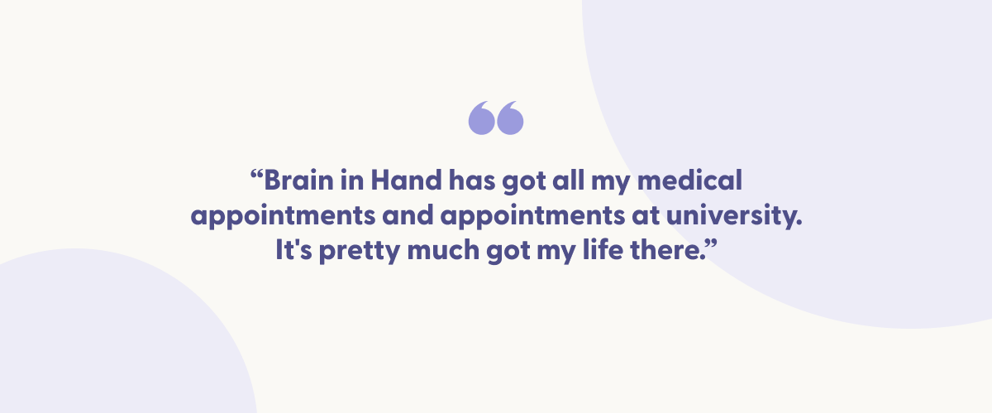
Embracing neurodiversity and better mental health
“It helped me better communicate my autism. I didn't acknowledge originally that I was autistic until I was probably in my late 20s. I don't treat it as a disability. It's my own superpower and especially my ADHD, it's my new superpower that I'm still getting used to. Brain in Hand has helped me acknowledge that a lot more and it's helped me go, OK, what can I do to help other people now?”
Brain in Hand supports Alfie to embrace and celebrate his neurodiversity. He takes a positive approach, using Brain in Hand to support himself, but also to train and educate others. He’s also experienced better mental health with the support.
“Since using Brain in Hand, my mental health has improved a lot. They've noticed a massive change at university where I've gone from being very hyperactive to not wanting to do anything, to going back to being my normal self again. That's all because I've managed to use the app, to communicate on the app, and train people to help me understand why I feel that way.”
Accessing on-demand support
“I really like the traffic light system. I know that if I press one button three times, I get people just checking up on me. It's nice to know that if I am in trouble there's always someone there. Instead of having to wait until Mondays to go and speak to someone at university. If I am in a tricky situation, there's always someone there and that's why I love the traffic light system. It means I can monitor my own behaviour as well.”
At Brain in Hand, we offer 24/ on-demand support that is easily accessible within the app. Alfie shares how he benefits from this support, expressing how valuable it has been in overwhelming situations.
“At university one time, I went into a meltdown because it was freshers week. I didn't have many friends on my course. They didn't know I was autistic because I didn't see it as a superpower. I thought it was another hindrance to me. I was very overwhelmed. I didn't know where to go, so I just hit the red button because that's how I was feeling. Next thing I know someone's calling me. They helped me get out of that situation to a safer place where I could calm down, self-regulate, and then communicate with my friends to touch base with them. Knowing that someone is there, means that I've got less pressure on me because if I am in a tricky situation where I do need help, they're there, which is so nice to have because you don't get it on many apps.”
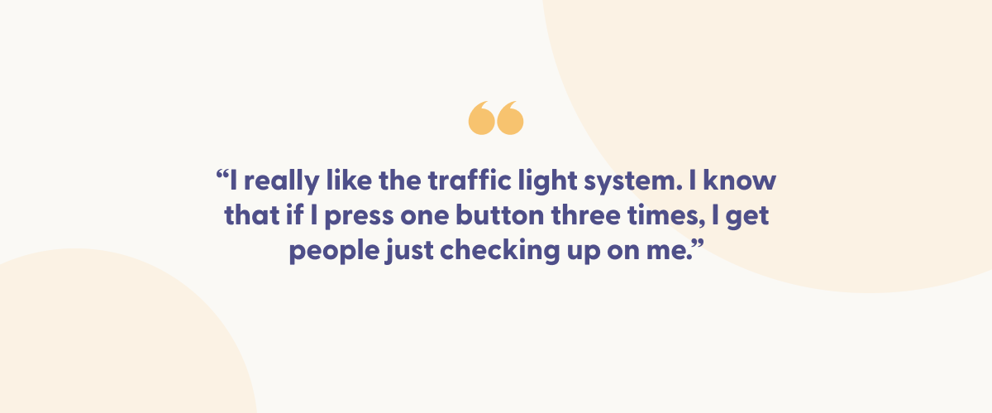
Regular check-ins and time management
“I always set reminders, probably every hour, to just check-in on how I feel. Sometimes it might be, I need to go in and just double check how I feel. Sometimes every hour, sometimes half an hour, depends on the situation. But it is a massive part of my life now since having the app on my phone.”
Alfie customises his Brain in Hand reminders to check-in regularly with his emotions. He shares how this log allows him to share how he’s been with his friends or university staff. This makes it easier for him to express how he’s been feeling. Alfie also uses Brain in Hand to manage his time, allowing him to have less things to keep track of in his brain.
“I'm terrible with time scheduling. Brain in Hand has got all my medical appointments and appointments at university. It's got when I'm due at placement. It's pretty much got my life there. I like the fact that the reminder comes up saying, right, you've got 15 minutes, you have to be at this place or you've got this, this and this and this tomorrow. I know where I need to be and I don't even need to think about it. It's one less brain cell that needs to be active constantly, which is kind of nice.”
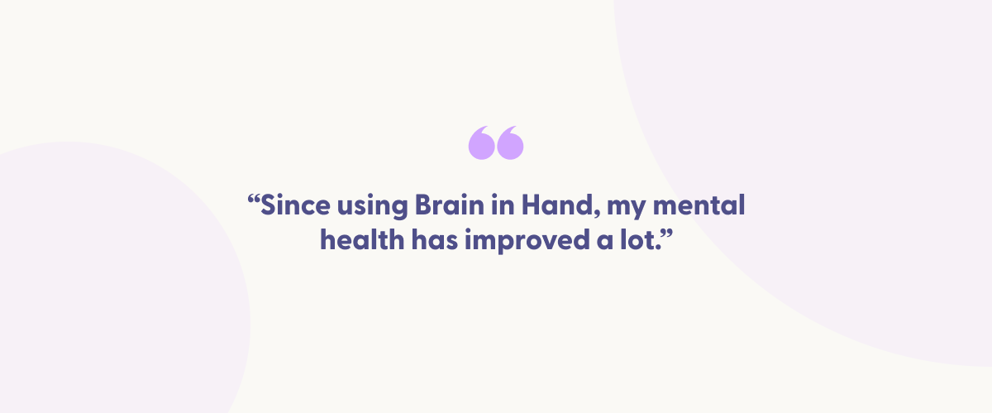
Raising awareness around neurodiversity
Alfie uses Brain in Hand as a tool to educate those around him. This makes it possible for him to communicate his needs to his friends, lecturers, and peers. It can be hard to get the right support when there is limited awareness, but Alfie is able to simplify that process using Brain in Hand.
"On my course, the lecturers didn't understand much about having an autistic student or knowing what help I need. They're still learning now and we're coming up to the end of first year. They still don't fully understand the support I need. But having the app and having it where they can go, OK, so this is how he's feeling and they can then see the traffic light system, they can understand it. It just means that every time I check-in with them, I don't have to go. OK, so this is how I've been over the past two weeks.”
“My friends know how to use it as well, they know if I'm having a bad day again, they just pop onto the app. They've got to know the traffic light system and I've been showing all the teaching staff how to use it. They're getting to know how to use it and especially on the disability side as well because before I had it, they didn't really know what it was. They're now being taught as well for students coming up behind me who hopefully get the app, they can then use it and then show them as well.”

Find funding to support your university journey!
Explore options tailored to neurodivergent students like Alfie
Take me there